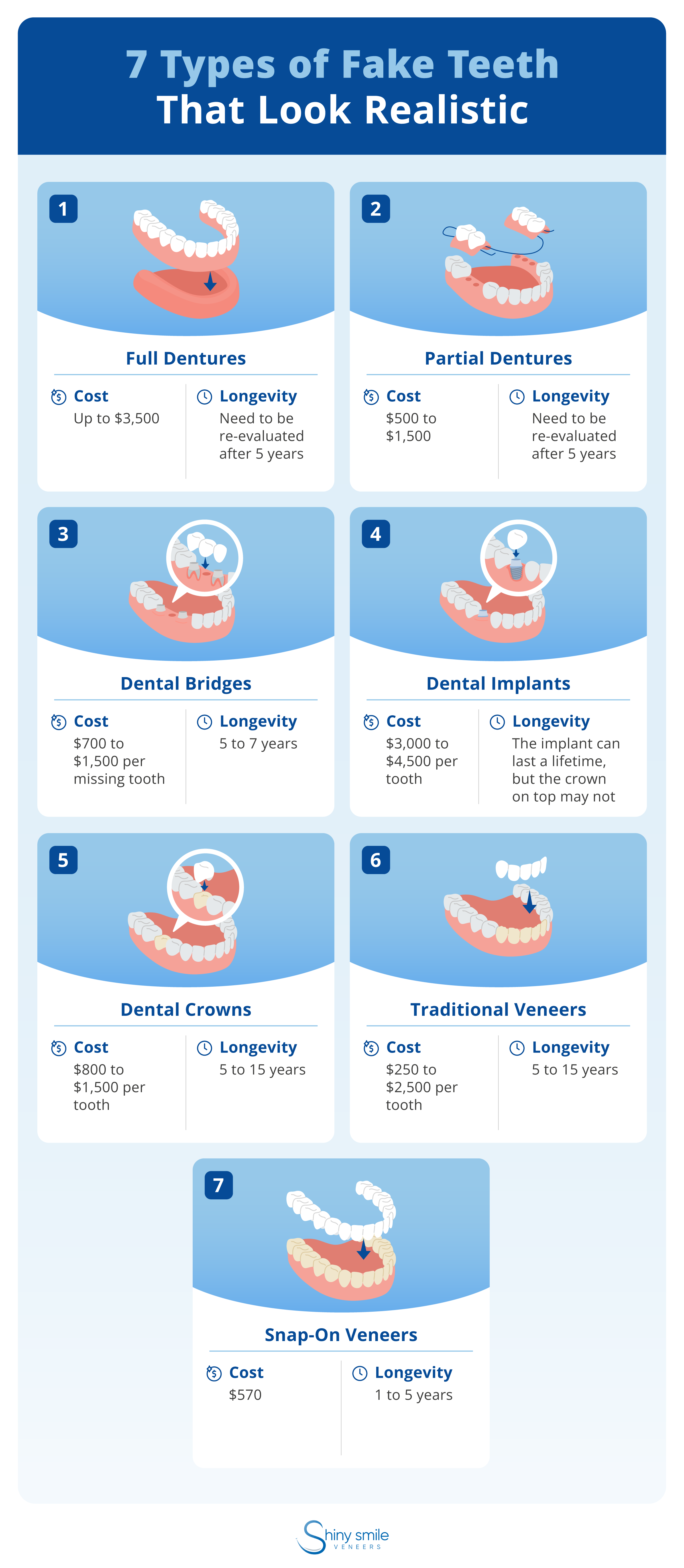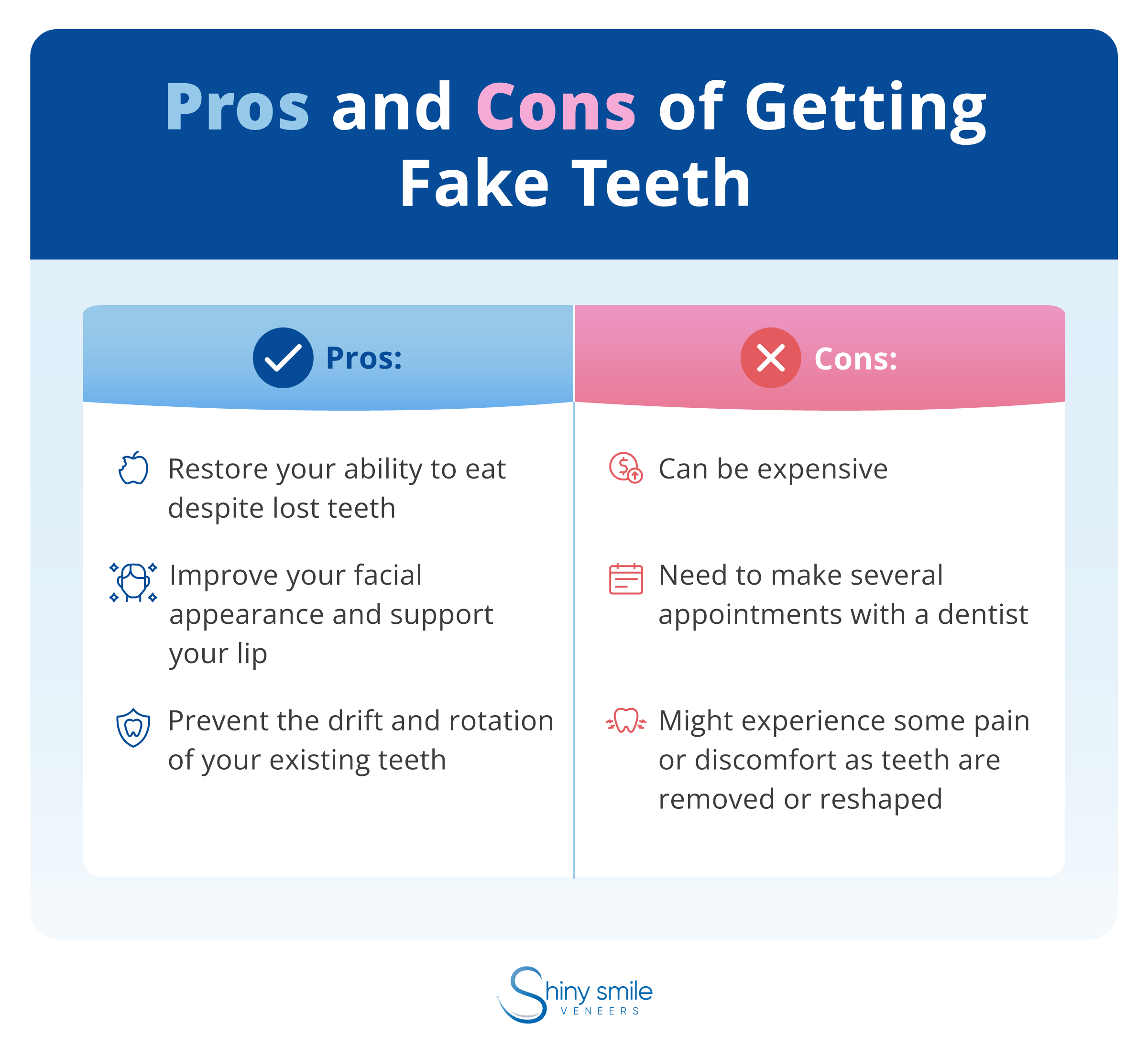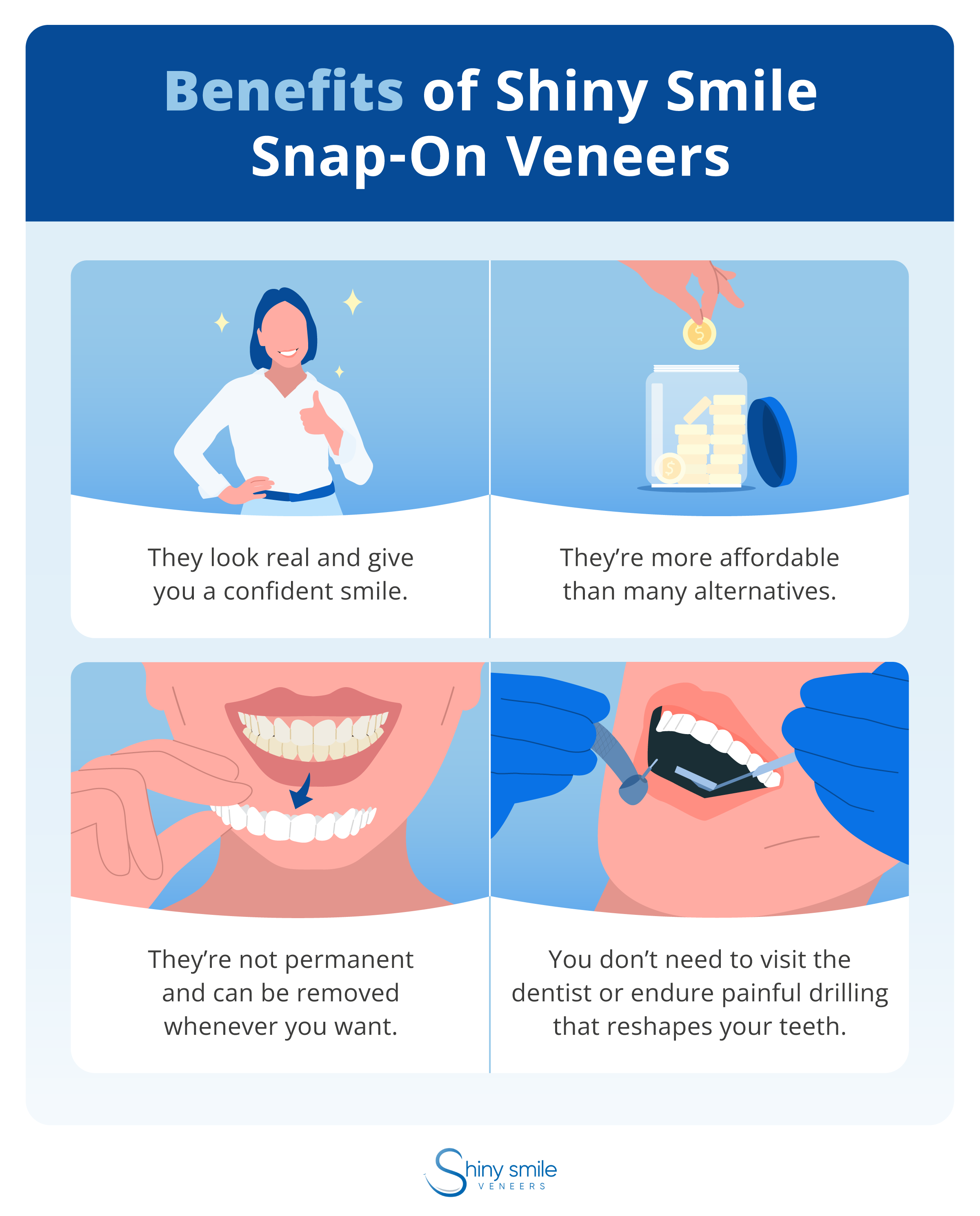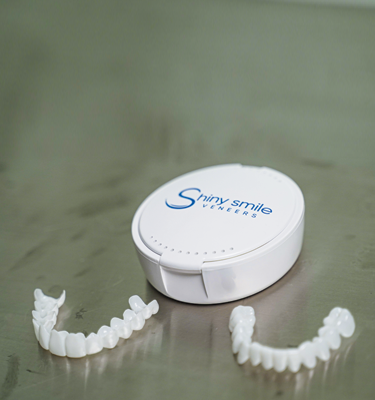

Dental flaws may make you self-conscious about your smile and affect your confidence. Luckily, modern cosmetic dentistry has completely revolutionized what is possible when it comes to transforming your smile.
This post explains some realistic fake teeth options, so if you’re looking for a smile makeover, you can decide which kind is best for you.
Table of Contents
- Are Fake Teeth Right for Me?
- 7 Types of Fake Teeth
- Pros and Cons of Getting Fake Teeth
- What Type of Fake Teeth Are Most Affordable?
- How Long Do Fake Teeth Last?
- How Much Care Do Fake Teeth Need?
- Benefits of Shiny Smile Snap-on Veneers
Are Fake Teeth Right for Me?
When deciding whether artificial teeth make sense for you, consider how much money you have to spend, how long the treatment lasts, and how much discomfort is involved in each process. False teeth come in both permanent and removable options.
Artificial teeth can conceal or treat dental flaws, including the following:
- Slightly crooked teeth
- Gaps
- Missing teeth
- Unsightly enamel
- Tooth discoloration and stained teeth
- Cracks
- Fractures
- Misalignment issues
7 Types of Fake Teeth
Fake teeth come in a variety of types, from individual tooth replacement to a full set of dentures designed to replace an entire arch (upper or lower teeth).
These options vary greatly in cost, complexity of procedure, and the kinds of dental issues they can correct. The right choice for you depends on your specific dental goals and oral health needs.

1. Full Dentures
Full dentures replace an entire arch of missing teeth, making them a good choice if you have lots of missing teeth.
You may need to have teeth extracted to attach the denture teeth to your jaw or gums. While full dentures use your palate for support, they may require a denture adhesive to keep them in place. You’ll also want to remove the appliance at night to clean it and to give your mouth a break.
Dentures can last seven to ten years, according to the American Dental Association (ADA), but they should be re-evaluated after five years. They may also need to be relined every one to two years for comfort, or whenever you notice a change in fit.
A complete set of dentures can cost up to $3,500 without dental insurance, but they’re often partially or fully covered by insurance.
The following types of dentures are also available, but they are more expensive (depending on the dentist you visit and the customization required).
- Implant-supported dentures: Also called permanent dentures, these attach to implants surgically placed in your jawbone and can only be removed by a dentist.
- Implant-retained dentures: These dentures also attach to implants surgically placed to your jawbone, but you can snap them in and out.
The cost of custom dentures varies depending on the quality of the materials used, but you could be looking at a range from $1,000 to $15,000 per arch.
2. Partial Dentures
If you’re not missing all your teeth, you can opt for partial dentures that attach to your existing teeth for stability.
Similar to full dentures, removable partial dentures typically use a base made of metal or acrylic — the acrylic will be a close match color-wise to your gums. The false teeth are attached to the base, and the base usually has a clasp of some kind so that it can attach to your natural teeth for added stability. This also makes it easy to remove your partial dentures to clean or store them.
However, partial dentures can increase the buildup of plaque leading to tooth decay and gum disease. You may also experience trauma to the gums due to the pressure and movement of the partial.
Like full dentures, partial dentures should be reevaluated every five years. Partial dentures are also quite costly, ranging from $500 to $1,500 without insurance.
3. Dental Bridges
A dental bridge is usually used when there are fewer teeth to replace or when the missing teeth are only on one side of the mouth. As the name implies, the dental bridge is used to “bridge” the gap caused by tooth loss between the teeth.
A bridge is typically made of two or more crowns connected to a filler tooth or teeth. The crowns keep the bridge in place. The bridge is made from different materials, including gold and silver, porcelain, and porcelain fused with metals. It usually takes two dental visits to complete a dental bridge.
Dental bridges typically last five to seven years. With good oral hygiene and professional cleanings, they can sometimes even last over ten years.
The typical cost ranges from $700 to $1,500 per missing tooth, so the total could reach $4,500 to replace several teeth.
You’ll pay more for an all-porcelain bridge than for a metal or porcelain-fused bridge.
While coverage varies by provider and location, dental insurance typically covers 40% to 50% of the cost of dental bridges.
4. Dental Implants
A dental implant is used to support one or more missing teeth. It is a titanium screw that can replace the root of a tooth, and is surgically placed into the jawbone. The entire process can take many months from start to finish.
The price for dental implant surgery is high and ranges from $3,000 to $4,500 per tooth. An implant-supported restoration of an entire arch can cost between $15,000 and $30,000. This amount reflects the average patients will pay out-of-pocket without the assistance of a dental insurance plan.
Dental implants can last a lifetime if properly cared for, but the artificial tooth on top may need to be replaced or repaired at some point.
Because dental implants may be considered a cosmetic procedure, not all dental insurance plans cover treatment. Check with your provider before making any decisions.
5. Dental Crowns
Crowns are not full fake teeth, but are “caps” that fit over teeth to strengthen or repair them. They can be attached to dental implants or used to add a bridge, which bridges the gap between missing teeth. Dental crowns can be made from various materials that differ in cost and longevity, including metal, porcelain, porcelain fused to metal, ceramic, or resin.
Because crowns require your tooth to be reshaped and natural enamel to be removed, the procedure may cause discomfort and is irreversible.
Depending on the material used, dental crowns typically last between 5 and 15 years and usually cost $800 to $1,500 each.
Dental insurance may cover crowns, but only when they’re medically necessary. Check with your provider to be sure.
6. Traditional Veneers
Rather than a tooth replacement like dentures or a tooth cap like crowns, dental veneers are thin tooth covers that bond just to the front of your teeth.
Typically made of porcelain or resin, traditional veneers require the removal of some of your natural tooth enamel. The process is irreversible, may cause discomfort, and requires at least two visits to the dentist.
How long veneers last and how much they cost depends on the material used to make them.
- Porcelain veneers typically last between 10 to 15 years. Composite veneers typically last between 5 to 7 years.
- Porcelain veneers usually cost around $925 to $2,500 per tooth. Composite veneers usually cost around $250 to $1,500 per tooth.
Your insurance may not cover the cost of veneers as they’re a cosmetic procedure.
7. Snap-On Veneers
Unlike permanent veneers, removable snap-on veneers fit over your teeth like a mouth guard. Also called clip-on veneers, snap-on veneers can cover missing teeth but require some teeth to attach to. Because you can fit them at home with a kit, you don’t have to visit a dentist or experience an uncomfortable procedure.
Snap-on veneers are considerably cheaper than the other fake teeth options above, making them an affordable way to cover your teeth. While temporary veneers may not be paid for by your insurance, they are generally affordable. For example, Shiny Smile veneers are often ranked the best snap-on veneers and only cost a total of $570. With regular use, snap-on veneers can last one to five years (or potentially even longer).
Pros and Cons of Getting Fake Teeth
Like any other dental or cosmetic treatment, getting fake teeth has both advantages and disadvantages.

Pros
Depending on the kind of fake teeth you get, they may help do the following:
- Replace the function of eating for lost teeth.
- Improve your facial appearance and lip support.
- Prevent the drift and rotation of your existing teeth after the loss of neighboring teeth.
- Minimize jaw bone resorption after tooth loss if implants are used.
Cons
The downsides of false teeth may include the following:
- Artificial teeth can be expensive, with dental implants costing up to $4,500 per tooth.
- Some kinds of fake teeth require time at the dentist’s office, which you may find inconvenient or stressful.
- Some dental procedures might cause pain or discomfort, such as the removal of tooth enamel, the reshaping of your teeth, or receiving surgical implants.
Normally you shouldn’t feel any pain, but sometimes some pain or pressure might be felt when you first start using your fake teeth. In most situations, it will quickly go away once you are used to them.
However, you may experience:
- Some slurring or lisping while talking.
- Some pressure on your teeth or gums.
- Some discomfort while trying to eat or bite.
What Type of Fake Teeth Are Most Affordable?
Of the common kinds of fake teeth available, snap-on veneers are the most affordable. As an example, Shiny Smile veneers cost $570. Snap-on veneers are also the easiest and most flexible option since they’re removable. Depending on the type and number you get, traditional veneers or crowns are usually the next most affordable.
How Long Do Fake Teeth Last?
Some fake teeth, like traditional veneers, can last a decade or longer with proper care. Even though the traditional veneer process is permanent, the veneers themselves will eventually need to be replaced as they wear out.
Other options, like dentures, may need to be relined every one to two years and re-evaluated every five years. To decide which option is right for you, compare the cost of the treatment with how long they last. You may find that a cheaper option is actually of better value.
How Much Care Do Fake Teeth Need?
Just like real teeth, most types of fake teeth require good oral hygiene such as brushing, flossing, and regular dental visits. If you have dentures, you may also need to remove them at night and put them in a denture cleaning solution. Fake teeth like veneers and crowns may require you to be careful when chewing hard food and to avoid consuming food and drink that stains (such as red wine).
Benefits of Shiny Smile Snap-on Veneers
If you want to change your smile but don’t want to invest the time and expense required for most cosmetic treatments such as porcelain veneers, crowns, or orthodontics, then you should consider snap-on veneers.
Unlike traditional veneers, which are permanently bonded to your teeth, snap-on veneers are removable. They are usually made from a high-tech dental resin and custom-shaped to fit snugly over your existing teeth, creating a new smile comprised of straight, white, and well-shaped teeth — all the things you might want from your smile but don’t have naturally.

They Look Real
Shiny Smile Veneers span the full length of your upper or lower jaw to cover your existing teeth, providing you with teeth that are brighter and whiter while also being properly positioned and sized.
They provide a realistic, natural-looking, and beautiful smile in a convenient form. Plus, Shiny Smile Veneers are comfortable and natural looking. You can even eat soft foods with the veneers in your mouth. However, make sure to stay away from hard food or extremely hot liquids, which can reduce the veneer’s lifespan.
Snap-on veneers can correct a myriad of cosmetic imperfections, including:
- Crooked teeth
- Chipped or cracked teeth
- Teeth that are permanently discolored and have not responded to teeth whitening
- Misshapen teeth
- Gaps between teeth
- A missing tooth or missing teeth
In addition, people who have missing teeth but are not candidates for crown, bridge, or dental implants may be able to have a full smile once again with snap-on veneers.
They’re Affordable
Since no dental work has to be performed on your teeth for snap-on veneers, this cosmetic dental option is also less expensive than other types of procedures such as traditional veneers, crowns, or dental implants.
This will save you hundreds of dollars in dentist fees and transportation costs, and you also won’t have to take any time off work to go to the dentist.
With Shiny Smile Veneers, you will only pay $570 for a full veneer set (top and bottom) instead of $250 to $1,500 per tooth for traditional veneers.
They’re Not Permanent
Another benefit of Shiny Smile snap-on veneers is that you can easily remove them any time you want, and your teeth will look just like they did before. Snap-on veneers give you the option of enhancing your teeth only when you want to, such as for a night out on the town or when you are attending an important business meeting.
There’s No Painful Drilling or Dental Visits
The Shiny Smile Veneer procedure is absolutely painless.
Because Shiny Smiles Veneers don’t require any type of dental work to be performed on your underlying teeth, you won’t experience any drilling, extractions, or anesthetic — a huge benefit for anyone averse to oral pain or afraid of the dentist.
You can place your snap-on veneers all from the comfort of your home. All you have to do is take your teeth impressions with the impression kit, then send them back to us.
We will create your personalized snap-on veneers and ship them to you within 14 to 20 business days.
Smile with Confidence
Snap-on veneers are an excellent solution for individuals with dental imperfections, and they’re created for people who do not want to go through extensive dental work or pay thousands of dollars for the perfect smile.
Shiny Smile Veneers has been changing the lives of thousands of people by helping them achieve a flawless, more confident smile. So if you find that your smile is less than impressive and stained, discolored, broken, or missing teeth are keeping you from living your best moments to the fullest, don’t hesitate to contact us today.

